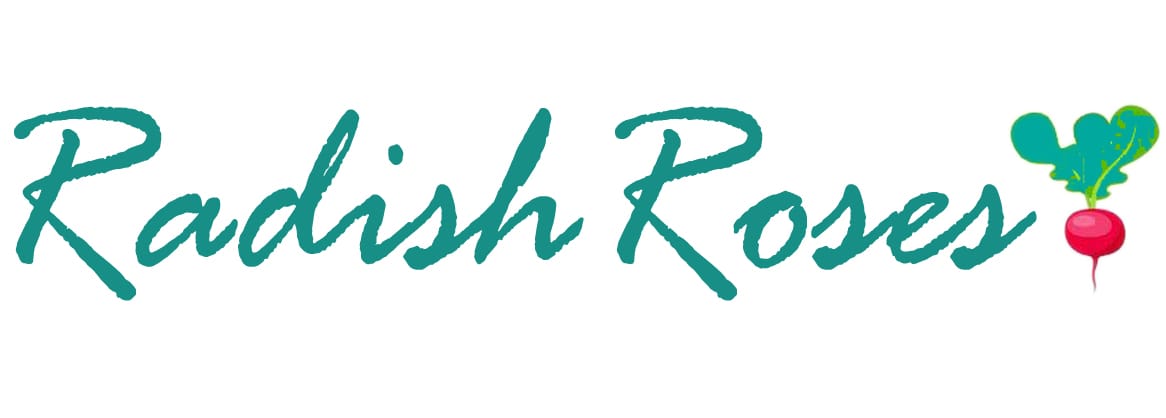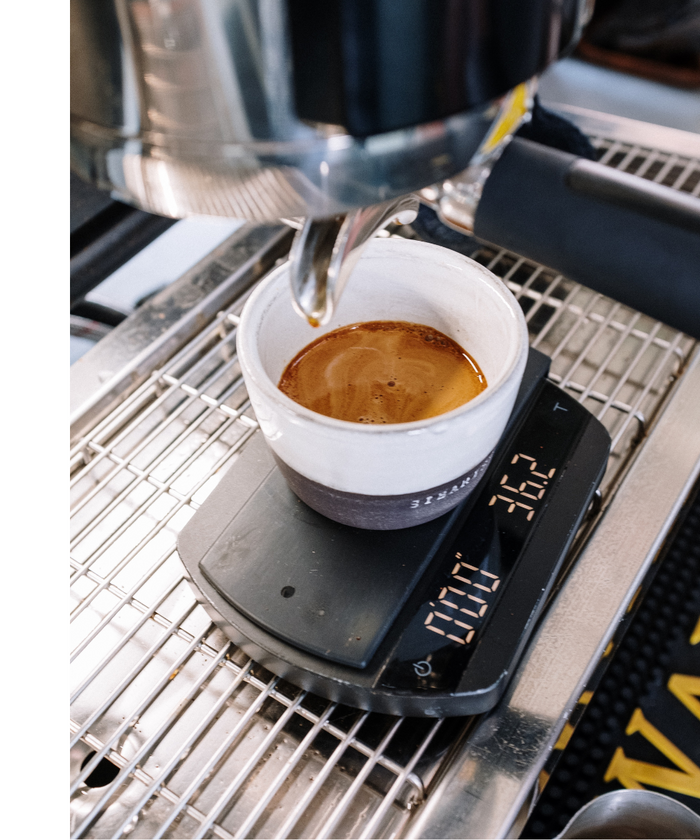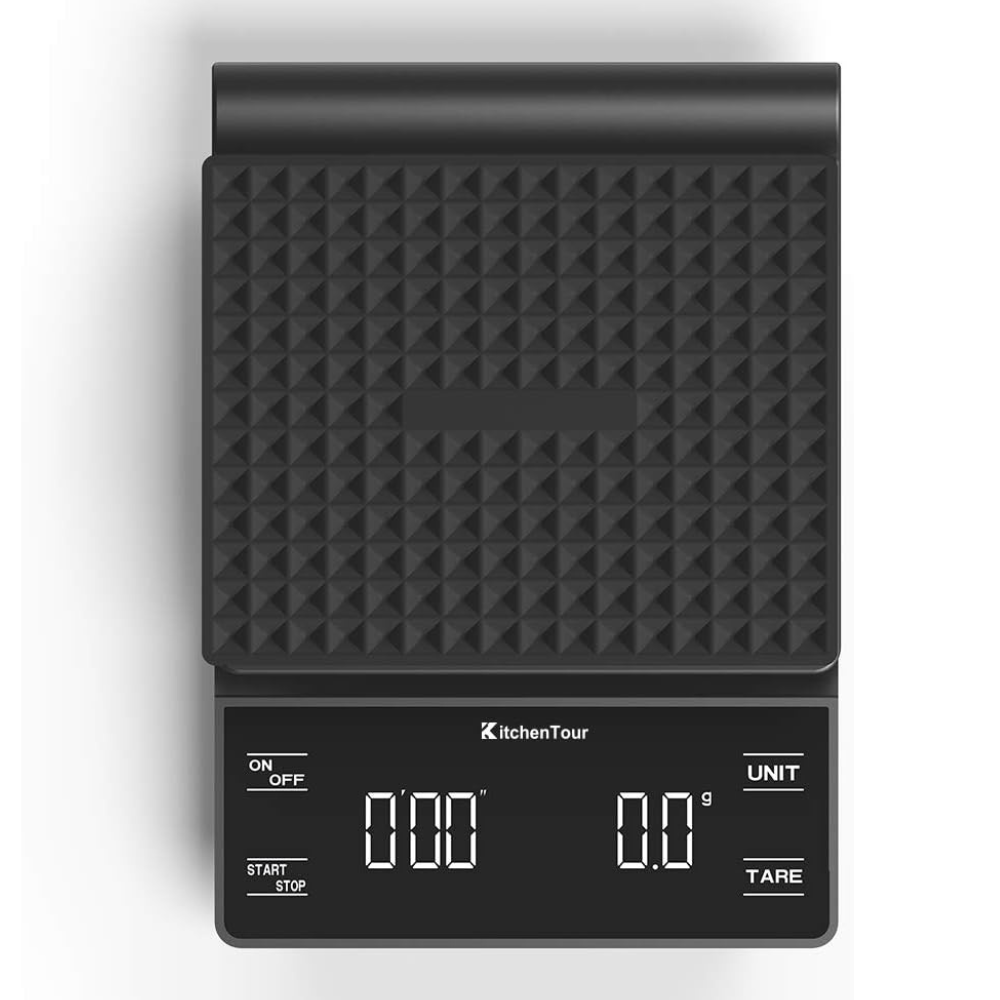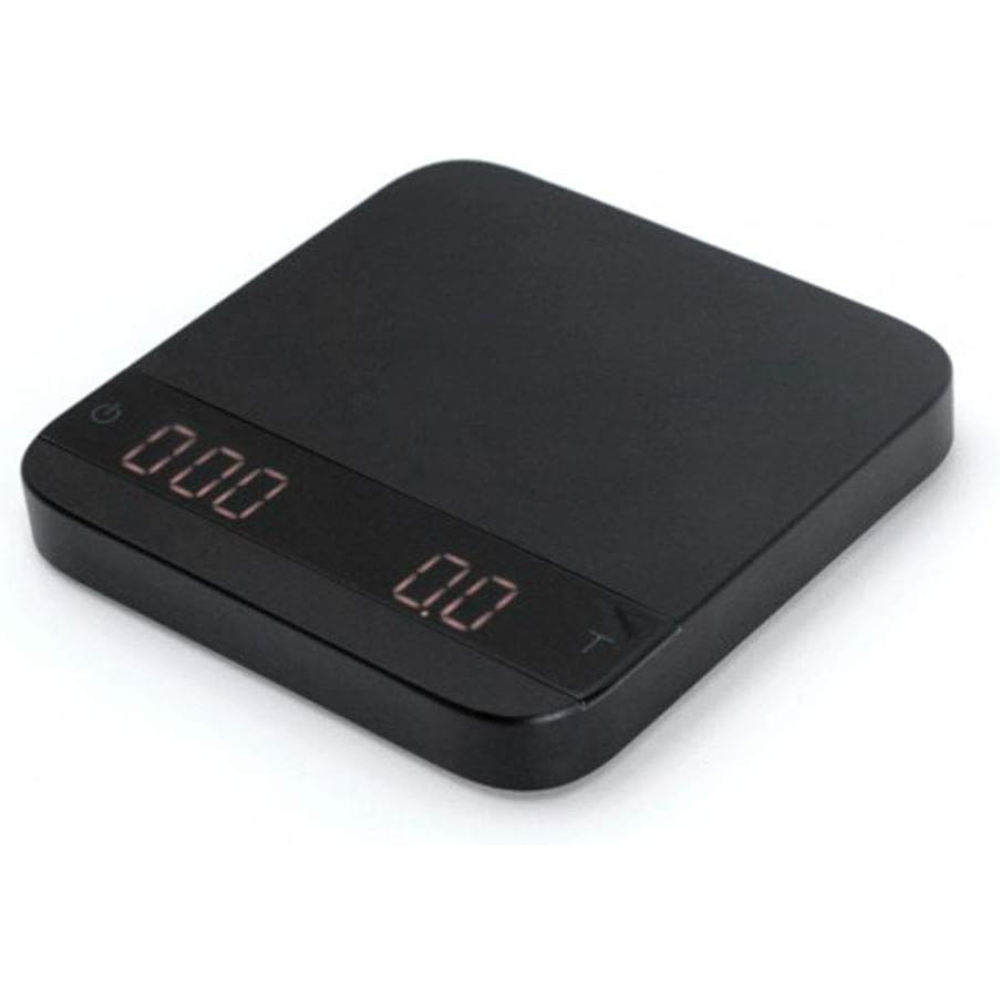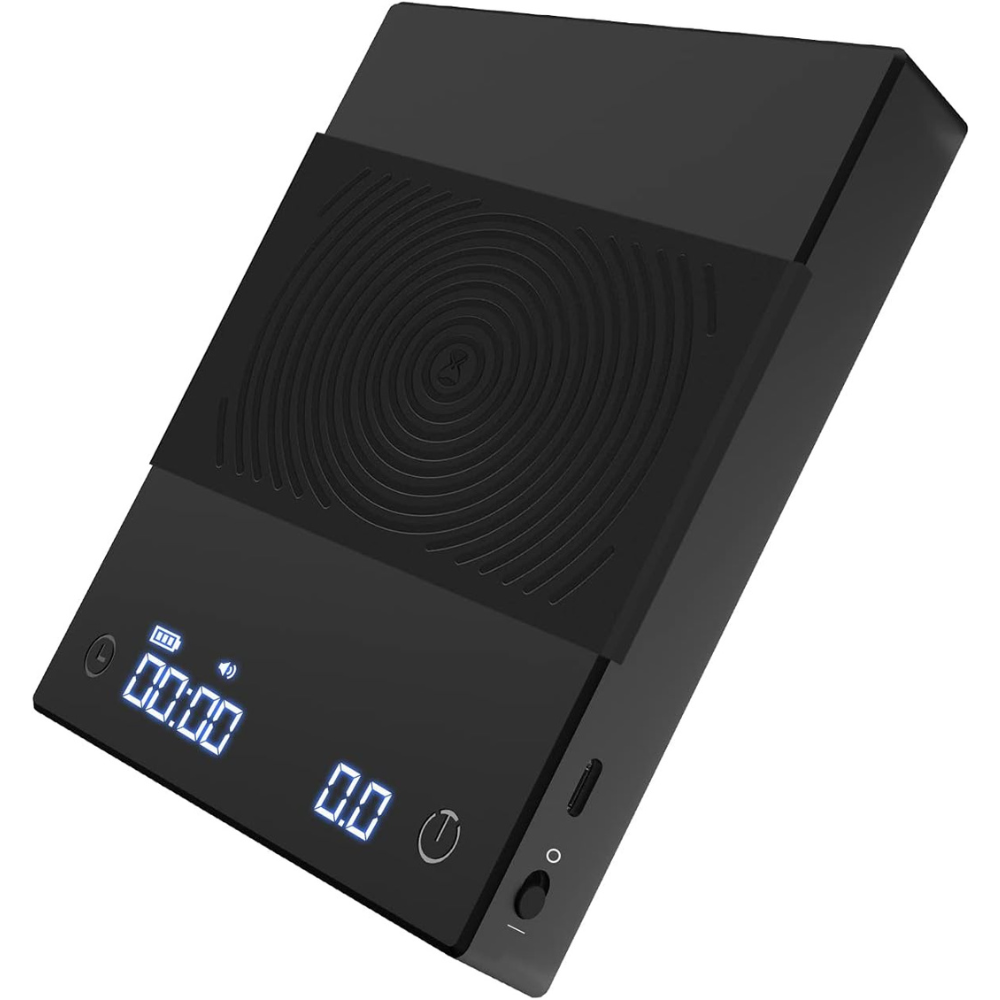Searching for the best espresso scale? Look no further!
If you are tired of trial and error when you brew espresso, it’s probably time to upgrade to a digital coffee scale.
If you are new to the world of espresso, it might be important to take a moment here to mention that "espresso" refers more to the brewing method, not the beans. Although, beans can be roasted to an "espresso roast", they are still coffee...that is used to make espresso. So, in this article, we will be using "coffee" and "espresso" interchangably when talking about both scales and beans.
When it comes to measuring coffee for brewing espresso, a precise scale is the key to consistency and quality.
When you use a coffee scale, you can measure the right amount of coffee, ensuring consistent espresso shots and extraction, resulting in optimal flavor.
Moreover, you can also avoid over or under-extraction of your coffee, which can result in wasting your expensive beans.
At RadishRoses, we have compiled all the information you need to know to make an educated decision when buying a coffee scale for brewing espresso.
We compared features and reviews for the top coffee scales to bring you a convenient list of the very best coffee scales to fit your needs and budget.
In this post, we will also discuss the importance of precisely weighing espresso to achieve consistent extraction and optimal flavor, as well as factors to consider when choosing a scale.
When choosing a reliable coffee scale, it is essential to consider various factors:
SIZE
Size and weight capacity are crucial as the scale should be able to hold the portafilter for pre-extraction weighing, and also fit on the espresso machine drip tray under the portafilter for accurate weighing of the espresso shot.
PRECISION
Precision is another aspect that is vital to consider when choosing a scale. Look for laboratory-grade scale technology to ensure that the scale provides accurate measurement. The best coffee scale measures to the nearest tenth (or 0.1 gram). It is also worth mentioning you want a coffee scale with a quick read time. A slow response time defeats the purpose when trying to weigh an extracted shot.
DURABILITY
Durability is also an important factor. Look for a coffee scale that is made of a durable material and is liquid-resistant since you will be using it while brewing coffee. A scale that is easy to clean and built to last long is worth investing in.
DISPLAY
The display can be backlit or have high contrast, providing better visibility especially when you are attempting to make your morning coffee. Many scales have an auto-shutoff feature, which can help save battery life.
TIMER
A timer is a beneficial feature that is common on even the least expensive coffee scale. Brew methods used in the specialty coffee industry include pour-over coffee brewing and the espresso brewing method. These coffee brewing methods become most consistent when an accurate coffee scale is used to perfect the controllable steps in the brewing process.
It is essential to invest in a high-quality scale that is accurate, durable and easy to use.
Additional features such as displays, auto-shutoff, and timers can further enhance the experience of making high-quality espresso shots.
By considering all these factors, you can achieve the ultimate goal of ensuring high-quality, consistent and delightful espresso shots.
Our Review Process - Finding The Best Espresso Scale
Making delicious espresso drinks requires precise measurements, and finding a reliable scale can be overwhelming.
It’s easy to get lost and become overwhelmed by the sheer amount of options available.
Forget spending hours researching important features and pouring over countless customer reviews.
At RadishRoses, we have compared thousands of consumer reviews and product ratings so you don't have to!
With our collection of the best espresso scales, finding the right one for you is easy and fast.
Get accurate and consistent measurements every time with these top-rated coffee scales.
Our Picks For Best Espresso Scale
KitchenTour Coffee Scale with Timer
What Stands Out:
- Affordable coffee scale
- Easy to read
The Details:
- Weighs to 0.1 gram
- Dimensions: 8.5 x 6.42 x 1.54 inches
- Built-in timer
- Auto shut-off after 2 minutes for longer battery life - can be adjusted
- Can switch between units: Grams (g), Ounces (oz), and Milliliters (ml)
- LCD display
- Durable, ABS material with silicone non-slip mat
- Large enough to weigh portafilter with ease, and can be used for brewing pour over coffee
The Downside:
- Might be too large to fit some espresso machines for weighing the shot. ***Users recommend turning the unit sideways for a better fit.
Acaia Lunar Espresso Scale
What Stands Out:
- Smart scale bluetooth connectivity
- Compact size
The Details:
- Dimensions: 4.13 x 4.13 x 0.59 inches -designed to fit in espresso machine drip tray to weigh a shot
- Measure coffee to 0.1g
- Auto start and stop timers
- Waterproof aluminum acrylic
- LED display
- USB charger, smart scale bluetooth connectivity and mobile app compatible
The Downside:
- Acaia coffee scales are MUCH higher priced than other scales
- On the small side when weighing portafilter
TIMEMORE Electronic Espresso Scale
What Stands Out:
- Sleek design
- Low profile for weighing espresso shot on the drip tray
The Details:
- Dimensions: 6 x 5.2 x 1.1 inches ***listed dimensions are 6 x 3.5 x 1.1 inches, but buyers report the width is just over 5"
- USB charger
- LCD screen
- Built-in timer
The Downside:
- The minimum accuracy is 0.5 g
- Larger size than other digital scales - middle of the road and works well for most portafilters and pull weighing, but to make sure it fits on your espresso machines drip tray, check your dimensions!
Questions about Espresso Scales - FAQs
When it comes to deciding among the best coffee scales, the choice can be overwhelming.
Even if you know what features you want, it’s hard to compare different models. You don’t want just any coffee scale, you want one that will meet all of your needs and is reliable for consistent use.
That’s where we come in. We have done all the research and gathered answers to common questions buyers have so you can make an informed decision about which espresso scale is best for you.
q: What is the golden rule of espresso?
a: The golden rule of espresso is to extract 2 to 2.5 ounces of coffee into your cup within 20 to 30 seconds from the moment you turn on the pump.
Ah, the golden rule of espresso! The perfect cup of coffee starts with proper extraction. This process requires time and patience but can really elevate your espresso experience.
The golden rule of espresso is to extract 2 to 2.5 ounces of coffee into your cup within 20 to 30 seconds from the moment you turn on the pump.
When doing this, you should try to get a consistent flow, with no slowdowns or splashbacks - this helps retain optimal flavor in the coffee and results in a delicious cup each time.
It's also important that you use freshly ground beans when making an espresso such as those found at most specialty cafes or online retailers who specialize in freshness and quality control for their products.
The roast should ideally be medium-dark so it has great flavor without being too overwhelming for someone starting with espressos.
Lastly, make sure your water filter is clean so there isn't any residual sediment that may affect taste/texture before heading into your machine!
q: Do I need a scale for espresso machine?
a: Absolutely! A scale is an essential tool for making delicious espresso every time.
It’s important to get the exact ratio of coffee and water to achieve the desired espresso flavor profile, and a coffee scale allows you to do this with precision.
Using a digital scale is recommended since it will provide you with precise measurements down to 0.1-gram accuracy—which is incredibly helpful when dealing with such small amounts of coffee grounds.
Not only does this make sure your espresso ratios are spot on, but it also helps prevent messes from forming on top of your machine caused by too much or too little coffee being used in each shot.
Plus, if you’re using a higher quality bean like those from specialty roasters, which can be expensive, having accurate measurements will save money over time since you won’t be wasting any unused coffee grounds!
Finally, there are other benefits beyond just measuring ingredients accurately.
As anyone who has made their fair share of espressos knows, getting the timing right between when shots start and finish foaming can be tricky - unless you have a clock timer attached to your machine that tells you exactly how long each shot should take (which some coffee makers offer).
By having a scale that measures weight instead of volume (like tablespoons or cups) - something gets filled faster at different temperatures than others-you'll know without fail whether each shot has been pulled correctly by its weight.
Additionally, having the best coffee scale will ensure consistent volumes better than other methods so that all drinks taste equally fantastic!
q: How accurate should espresso scale be?
a: An espresso scale should be accurate to within 0.1g at a minimum.
That means that if you're making espresso, the scales should read accurately up to two decimal places and have an accuracy of 0.01g or better.
Any good barista needs to have a reliable and precise scale when they are taking on the process of making espressos as it is essential for getting the grind size, dose, and tamping pressure all right to make a good shot of espresso.
This level of precision is also needed when weighing beans to ensure that each drink has enough but not too much coffee in them which will lead directly to more consistent shots overall - something that anyone who enjoys their daily cup(s) desires!
The ability of scales used in cafes or home environments to maintain consistent reads as well as remain exceedingly accurate over time allows baristas (and those practicing barista-like skills at home!) peace of mind, knowing that no matter what they are doing with their machines, the scale will be ready and able assist with their quest for great espresso every single time!
Aside from reading accurately up to two decimal places (with an accuracy rating below 0.01g), some more experienced users may want extra features from their espresso scales such as pairing capabilities with mobile devices like smartphones & tablets via Bluetooth; multiple function modes including "pour over," "tare," "timer," etc.; portability; durability; waterproof abilities; LCD backlighting; USB rechargeable batteries; auto shutoff feature after 5 min of no use...the list goes on!
All these little extras can help provide added convenience during mundane tasks like weighing grounds before brewing coffee- something many people don't realize how important it is until they experience its absence first hand ;)
All this being said however the most important rule remains: Always buy quality equipment designed specifically for your desired purpose rather than simply relying on consumer-grade 'kitchen' scales often found in grocery stores or online shops – especially when dealing with finer ingredients like coffees and teas because great results can be worth the extra cost!
q: How many grams is a perfect espresso?
a: Generally speaking, the ideal dose of coffee for a single shot of espresso should be between 7-10 grams.
It’s essential to get this measurement right to ensure that your espresso has a pleasant flavor with good body and no bitter aftertaste.
When it comes to grind size, you want something very fine but not too fine (an overly fine grind can lead to channeling).
The best way to achieve this is by using precise coffee scales and/or a burr grinder as these provide much more accurate measurements than other methods.
You will also need to invest some time in playing around with different doses to find what works best for your specific combination of equipment and beans – it won't necessarily be exactly 7 or 10 grams every time!
Once you have found your ideal dose weight range (7-10 grams), proper tamping techniques come into play which can significantly affect taste too.
Tamping is a vital part of creating an evenly extracted cup since it prevents water from taking undesirable paths through the grounds leading to poor flavor extraction as well as over-extraction resulting in bitter notes.
A reputable barista should be able to give you helpful insights on proper tamping techniques including how much pressure they recommend applying while tamping and how deep into the portafilter they prefer doing so.
Getting consistent results when brewing espresso requires skillful experimentation, and full attention during each step involved in making espresso such as when measuring out doses accurately or tamping firmly yet gingerly - all these little details can add up quickly for better or worse!
q: Do you weigh espresso before or after grinding?
a: The rule of thumb when it comes to weighing espresso beans is to do it before grinding.
This ensures that you have the correct amount of grounds for a specific dose size, and makes it easier to adjust as needed. In other words, when you weigh out your beans in advance, you’ll know exactly how much coffee and water should be used in each shot.
Grinding the beans too early can also lead to losses due to varying grind sizes and the oxidation of aromatic compounds, so grinding right before extracting your shot will generally give you the freshest-tasting espresso possible.
It is important to weigh your shots after extraction as well.
This will help determine whether or not your grind settings are producing shots with consistent weights from one to the next.
Tracking these measurements gives valuable insight into what changes need to occur for optimal espresso extraction results!
q: How long should an espresso shot take?
a: The ideal espresso shot time is between 25-30 seconds.
This amount of time allows the hot water to pull out all the right flavors from the ground beans while avoiding over-extraction, which can leave an unpleasant bitter taste in your drink.
An extraction time shorter than 20 seconds would mean that not enough essential oils have been extracted from your grounds, leaving you with a weak, tasteless cup.
Too much longer than 30 seconds and you risk extracting too many tannins, resulting in a sour or overly bitter flavor.
The actual extraction process begins when heated water is forced through finely-ground coffee beans at pressure levels ranging between 9 to 17 bars (or 130 to 250 psi).
During this process solubles such as sugars, oils, amino acids and proteins dissolve into the water stream creating what we know as espresso; flavorful compounds being released during this period give us that classic “crema” on top of our drinks!
By controlling 4 key variables: Grind size (fine vs coarse), Weight (measured with espresso scales), Tamping Pressure (hard vs soft), and Shot Time (20 - 30 sec) baristas can make sure they serve consistent tasting shots each and every time!
To get the most out of any coffee brewing experience be sure to start with freshly roasted beans ground in different settings depending on what type/brand of machine you’re using or if it has a manually adjustable grinding system try testing them out by doing trial samples until you find just the right balance for your preferences.
Additionally, before beginning any extraction cycle make sure your machine has had its daily cleaning ritual done as stale residues left behind could affect both taste & aroma profiles!
So, Which Espresso Scale is Best For You?
We hope this guide helped you decide on the best coffee scale for your needs. No matter your price range or budget, there is an option for everyone - so check out our top picks!
Remember, it's important to consider what features you need most - be it accuracy, ease of use or even cost.
We have searched through thousands of reviews and compared features, to help you find an option that works great for you.
We recommend revisiting your favorite models and learning more about them by clicking the link beneath each product.
Enjoy your new espresso scale!
